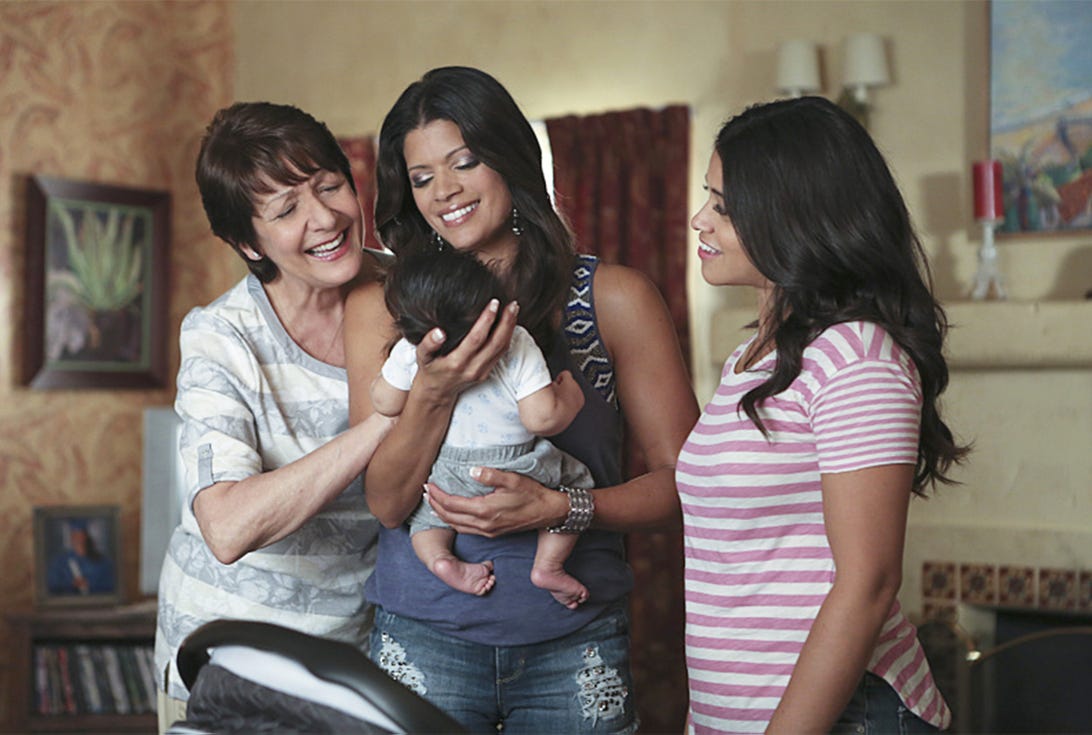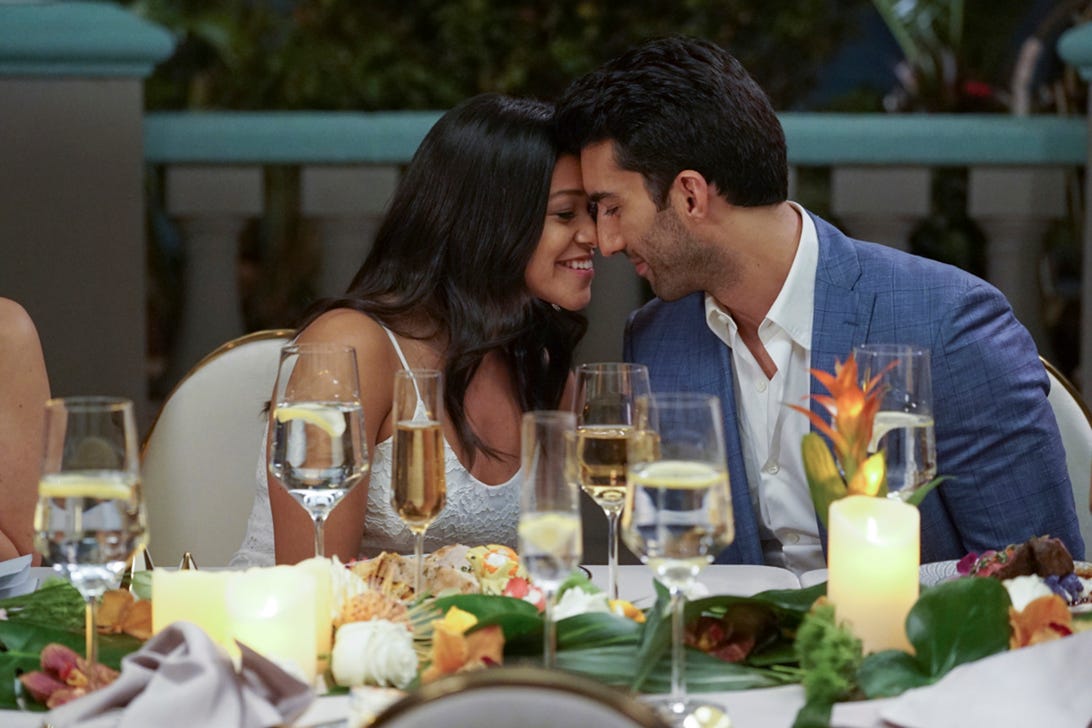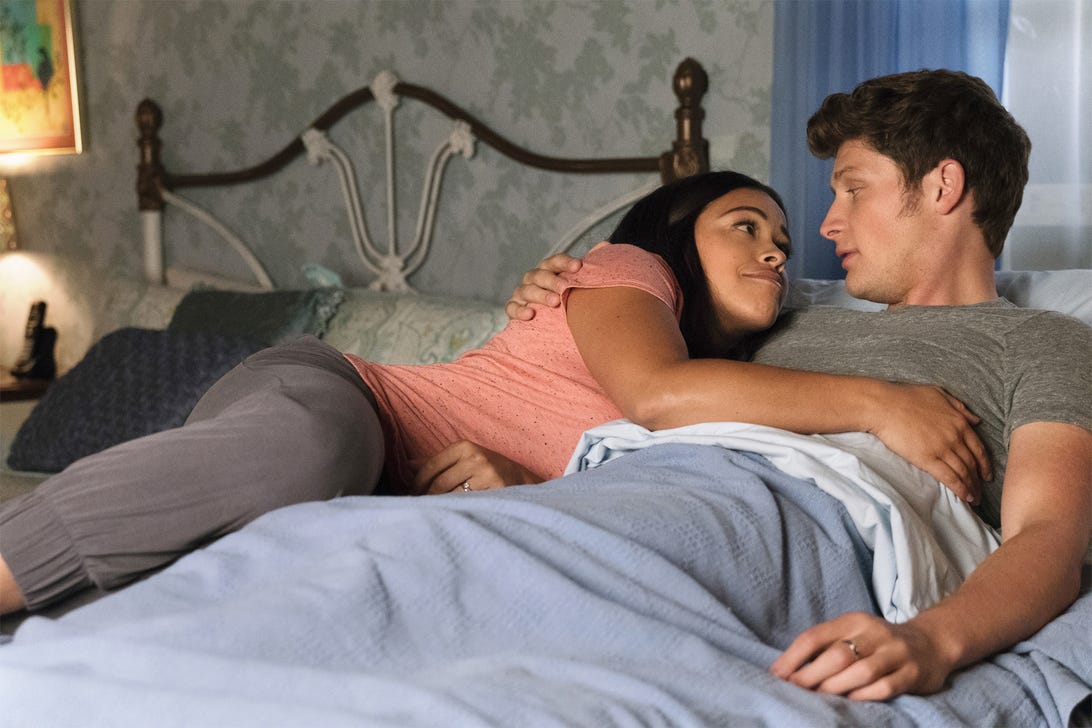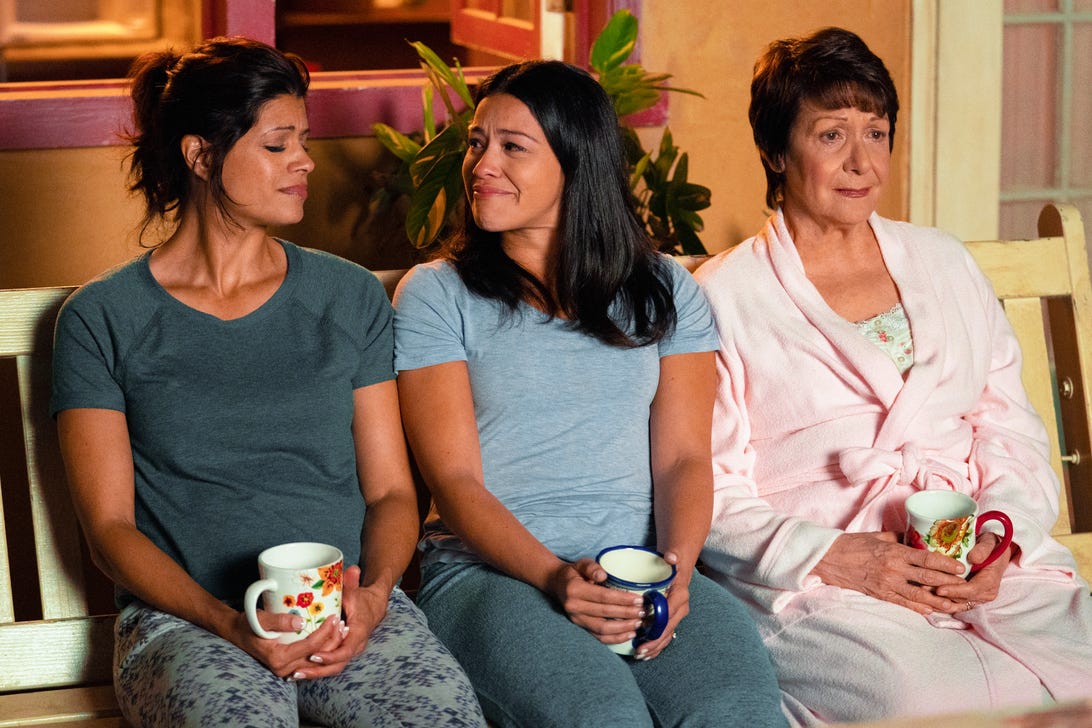
'Jane the Virgin' Gave Us a New Definition of What Prestige TV Can Look Like
The Villanuevas are a different kind of master class.
When Jane the Virginwas initially announced as part of The CW's 2014 lineup, the concept raised a lot of eyebrows. A show centered around the idea that a Catholic virgin was unintentionally artificially inseminated? Surely this would go horribly wrong. Certainly this show would be dragged through the media streets upon premiere, destined to reveal itself as some ham-fisted attempt at edginess. It's lucky for us all that that is not what creator Jennie Urman had in mind. Contrary to initial expectations, Jane the Virgin delivered one of the most thoughtful, loving, and masterfully crafted series of the past decade.
The show will end with its 100th episode this week, and it will be a genuine loss for television. But the show's existence, and what it's done with its time on air, should serve as a lasting lesson for storytellers everywhere -- of how to push boundaries without jumping the shark, how to stay true to characters, and of how to make fearless art focused on marginalized groups and underestimated genres. If Jane the Virgin doesn't belong in the hall of prestige TV greats, nothing does.
When Jane the Virgin premiered in October 2014, Gina Rodriguez was a relatively unknown actor. Her character, Jane Villanueva, falls asleep at the gynecologist only to discover a few weeks later that she's pregnant from an accidental insemination and the father is her boss and former crush Rafael Solano (Justin Baldoni). She's engaged, though, to steadfast cop Michael (Brett Dier), which causes a few complications when she realizes she has feelings for Rafael. What throws that love triangle into real turmoil though, is the mysterious murder at the hotel Jane works at -- that Rafael owns. Oh, and there's the fact that her long-lost father Rogelio (Jaime Camil) is the star of her favorite telenovela, and her mother has lied to her for years about it. Jane the Virgin is a show that knew what it was from the jump: A story about a grounded working class woman whose circumstances are anything but grounded. It's a romance, a telenovela, a family drama, a mystery, sometimes a thriller, with comedic moments in there, too.
Over its five seasons, Jane the Virgin has had an engaged audience, a leading lady with a strong point of view, and drama that often hinged on a major love triangle. That last bit set the series up for a tricky landing in Season 5, with the loyalties of its viewership divided by romantic preference. What the show's final two episodes bring home, thankfully, is a reminder that Jane the Virgin has never been about just the one thing, let alone the man Jane ends up with. What makes Jane the Virgin masterful as a series is its feverish blend of genres. It's not even a juggling trick, because that would imply that the series separates its modes from each other. Instead Urman blurs them all together, expecting audiences to follow kidnapping plots alongside questions about parenting techniques or whether or not Jane should go back to waitressing. This is a show that literally has criminals stealing faces and balances it with scenes of three generations of Jane's family sitting on a porch swing together, processing the everyday happenings of their lives. A cheeky narrator (Anthony Mendez) helped audiences navigate through the show's constant tone and genre shifts, and the writers blended the elements with a mostly steady hand. Jane the Virgin has always prioritized grounded human drama over the melodramatic, without sacrificing either element. The show mastered interweaving genres precisely because it knew the blend allowed the tropes of each to be seen in a new light. It's somewhat of a miracle this show managed to be coherent at all. But it just worked.

Jane the Virgin hasn't had a perfect run -- it lagged a bit in the middle seasons, and big plot swings come with big risks. It's also not the first of its genre; Ugly Betty(adapted from a Colombian telenovela by ABC) blended telenovela elements with complex, three dimensional characters back in 2010. Overall, though, Jane the Virgin is a show that has always fought for nuance, and the result is a remarkably artistically sound series. It's also a reminder of what can happen when those in charge of a series are confident in their vision and know when it's time to wrap things up.
As the series winds to an end, it's time to look at Jane the Virgin's run for what it's been: A crucial reminder that "prestige" TV -- or whatever you want to call stylized, artistically challenging narratives poured over by the most brilliant minds in television -- can take many forms. In this case it's been high femme, genre-bending innovation with big splashes of blue and pink and lavender; melodramatic plot twists served with a wink and a crash-cut to black; a latinx family centered and lovingly realized; love triangles and flowery fairy tale dream kisses grounded by the emotional reality of what it takes to be human.
The phrase "prestige TV" may be outdated by now, a relic of the era when Mad Men and Breaking Bad had viewers pouring over unique details and heaping praise on the (male) "auteurs" who created them. Maybe our era of peak TV doesn't need a phrase like that anymore; perhaps Leslye Headland was right when she wrote in The Hollywood Reporter that there was something inaccurate and misogynistic about the "auteur myth," especially in how it has a habit of erasing women.

Maybe we shouldn't be evaluating Jane the Virgin on those terms at all, even though its dearth of Emmy recognition will always sting. Jane the Virgin loyalists have always known that because of the show's inherent femininity, and the fact that it airs on the soapy, sexy CW (full disclosure: The writer of this piece writes for a CW show), being seen as "sophisticated," "prestige" TV an uphill battle. And think about the women-led series that often do break into being considered "prestige." Big Little Lies, Sharp Objects, The Handmaid's Tale -- many of them deal in trauma and dabble in emotional bleakness. It's a fruitful ground to pull from, for sure, and a worthy pursuit that can lead to great television and much-needed representation of tough issues. And Jane the Virgin didn't shy away from trauma, either: The series honors its characters' emotional reactions to their dramatic lives, and the mental health consequences. But watching Jane the Virgin never stopped feeling like taking a warm, aromatic bath and slipping into bed well-moisturized and in your softest pajamas. It feels like trauma's antithesis. And regardless of if you ascribe to the imaginary borders of prestige TV, Jane the Virgin has innovated enough to be considered a standard bearer.
All I know is that the creative rigor of Jane the Virgin is evident in every episode. That a team led by a woman creator championed inclusion at the same time as it poured over intense artistic and narrative detail -- breaking ground both centering a Latinx family and bringing magical realism into a whole new light on television. Shows as thoughtful and emotionally mature as Jane the Virgin remain rare, even with so many series on the air. With bold colors and patterns everywhere, it's easy to pick a shot from Jane the Virgin out of a lineup -- the visual language of the show is so distinct and ever-present. It's easy to forget, given the warmth of the show, how much sophisticated artistry goes into creating that experience. Don Draper eat your heart out; the Villanueva women are so intricately sketched they feel like women you could actually know, even as they have to deal with the occasional husband coming back to life. Watching the finale episode (screened in advance to critics) I felt a tangible loss, because I realized that -- given that they are fictional -- this really would be my last time visiting the Villanueva household, experiencing new chapters of their story.

The final season of Jane the Virgin opened by folding the narrative back towards its origins. As Jane's thought-to-be-dead husband Michael appears back in her life with amnesia (hello, telenovela), the elements of the series's original love triangle once again took center stage. The plot twist was a reminder that old ghosts and attachments don't just go away. The thing is, though, that we change, and none of the central romantic trio were in the same places they'd been the last time Michael had been "alive" in Jane's life.
If this series had been one thing -- romantic drama -- its finale would have already aired, wrapped up after Jane chooses Rafael, embracing the parts of her life that have evolved and leaving Michael in her past. But that happened all the way back in episode 88, and there are 100 episodes total. The show has always had a deep respect for romance -- and it certainly plays a big role in the finale -- but as we know, Jane the Virgin contains multitudes, and Jane's story has never been confined to that of her love life.

Every character in Jane the Virgin's ensemble cast has come a long way from who they started out as. Never have I been less worried about how a show will end than I was this season, even when I didn't know exactly where they'd take us in the remaining episode. This season forced Jane to confront every element that had defined her adulthood, from the generational, to the romantic, to the creative, to finally facing down with the villain who'd kidnapped her child and haunted her dreams. It all leads to a finale so filled with love that it will bowl you over with it. To some it will feel saccharine -- personally, I feel that every moment of it was well-earned. That's the beauty of watching telenovela-meets-family-drama-meets-romantic-comedy. Leave the wry smirks to the other shows.
This is a series that's been crafted with loving care from top to bottom. It's challenged television norms while mixing senses of joy, wonderment, humor, and juicy melodrama. And though it hasn't always been recognized by traditional and tired standards for "prestige TV," in many ways Jane the Virgin is one of the most relevant and sophisticated shows of its era. Thank goodness we got to be here to witness its glowing heart.
Jane the Virgin concludes Wednesday July 31 at 8/7c.